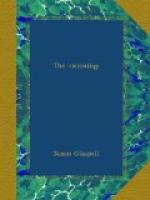Later she had stopped to see Mrs. Prescott, and she, as she so often did, talked of Katie’s mother. Katie was glad to be talking of her mother, and, as they also did, of her father. It brought them very near, so close it was as if they could know of the beautiful happiness in their child’s heart. They talked of things which had happened when Katie was a little girl, making herself as the little girl so real, visualizing her whole life, making real and dear those things in which her life had been lived.
As she thought of it again that night, after she was dressed and was waiting, hurt did come in the thought of his feeling for the army. She must talk to him again about the army, make him see that thing in it which was dear to her.
Though could she? She did not seem able to tell even herself just what there was in her feeling for the army.
Instead of arguments, came pictures—pictures and sounds known from babyhood: Men in uniform—her father in uniform, upon his horse—dress parade—the flag—the band—from reveille to taps things familiar and dear swept before her.
It would seem to be the picturesque in it which wove the spell; but would her throat have tightened, those tears be springing to her eyes at a thing no deeper than the picturesque? No, in what seemed that fantastic setting were things genuine and fine: simplicity, hospitality, friendship, comradeship, loyalty, courage in danger and good humor in petty annoyances.
Those things—oh yes, together with things less admirable—she knew to be there.
She got out her pictures of her father and mother; her father in uniform—that gentle little smile on her mother’s face. She thought of what her mother had endured, of what hosts of army women had endured, going to outlandish spots of the earth, braving danger and doing without cooks! She was proud of them, proud to be of them.
She lingered over her father’s picture. A soldier. Perhaps he was of a vanishing order, but she hoped it would be long—very long—before the things to be read in his face vanished from the earth.
Through memories of her father there many times sounded the notes of the bugle—now this call, now that, piercing, compelling, sounding as motif of his life, thing before which all other things must fall away. She seemed to hear now the notes of retreat—to see the motionless regiment—then the evening gun and the band playing the Star Spangled Banner and the flag—never touching the ground—coming down for the night. She answered it in the things it woke in her heart: those ideals of service, courage, fidelity which it had left her.
She would talk to him—to Alan (absurd she should think it so timidly—so close in the big things—so strange in some of the little ones)—about her father and mother. To make them real to him would make him see the army differently. It hurt her to think of his seeing it as he did, hurt her because she knew how it would have hurt them. To them, it had been the whole of their lives. They had not questioned; they had served. They had given it all they had.




